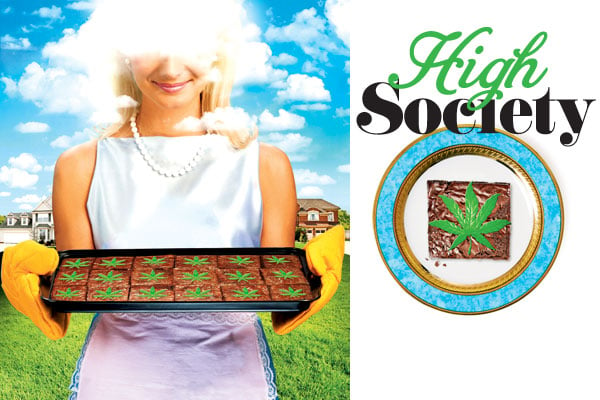The plant is fairly common among lawyers, doctors, and other high earners. “It’s rampant in health care,” says a Virginia nurse.
But Washington is “schizophrenic” when it comes to marijuana, says Allen St. Pierre: There are plenty of people here who smoke pot, but not many who will talk about it.
“We wear gold marijuana lapel pins when we lobby,” St. Pierre says. “In DC, everyone thinks I’m Canadian. They’ll go, ‘Oh, hey—maple leaf!’ And I go, ‘No, no, cannabis leaf,’ and the immediate facial reaction is either a quirky smile or a furrowing brow as if someone just put a stinky cheese under their nose.”
Until the dispensaries open, some patients have to go to great lengths to get marijuana. A DC businessman who was in the end stages of renal failure until his kidney transplant this winter used marijuana to help him sleep and to fend off depression.
He had dialysis treatments three times a week. “It’s horribly depressing, but a couple of bowls and you’re perked up,” he says. The patient, who is in his fifties, got his marijuana from New York, where there are legendary delivery services, then brought it home on Amtrak or the BoltBus. “You could take a body on those things and no one would know,” he says.
Who can get a Prescription?
The DC law that legalizes medical marijuana spells out which conditions and treatments qualify patients to obtain a marijuana prescription. The law also contains a clause that would allow the District to expand the list. According to the DC Department of Health, no other conditions are currently on the table, but the city’s government will consider adding more after assessing the program’s early stages.
-
HIV/AIDS
-
Glaucoma
-
Conditions characterized by severe and persistent muscle spasm, such as multiple sclerosis
-
Cancer
Conditions
-
Chemotherapy
-
Treatments involving azidothymidine or protease inhibitors (found in anti-retrovirals and other drugs used to treat or prevent viral infections)
-
Radiotherapy
Treatments
By Marshall Worsham
Sources say it’s easier to fly marijuana into Reagan National Airport than Dulles, hiding small bags of pot in toiletries or bringing it in edibles. One of Sara’s customers even ate a pot cookie in the air to allay her fear of flying.
“I flew into BWI from California with no problem,” says a DC thirtysomething who used to deal marijuana. “I had Jolly Ranchers, lollipops—I just peeled off the stickers. You can suck these candies at work. No issues, no problems, no smell.”
Closer to home, customers in Washington often get their marijuana from dealers—almost always found through word of mouth—who work in restaurants. Other local dealers work as lawyers, legal assistants, massage therapists, and in medical sales.
Many buyers mention dealers who are suburban parents. “I know people who have been doing this for their whole career,” Sara says. “Most of them are women. Almost all of them are moms.”
Dealers say moms are doing much of the buying, too. A longtime dealer who graduated from Churchill High School in Potomac often picked up customers at a busy intersection and conducted the deal while driving them to work. “These people are highly successful professionals and parents who work all day, commute, and don’t want to go anywhere else, so they’ll pay a little extra for me to do that,” he says. “There are a lot of millionaires buying, and a lot of moms.”
“Never in front of the kids,” says a Fairfax County mother of grade-schoolers. “The kids will be with a babysitter and we’ll go to someone’s house, play Wii, and pass a bowl around. Or smoke while we’re at a barbecue, making dinner, or having margaritas. It’s not woven into the fabric of our lives. It’s something to look forward to at the end of the week. It really takes the edge off.”
The mother, who gets pot from a friend who picks her own buds at another friend’s farm in West Virginia, doesn’t worry that her children will find out: “My biggest fear is other parents. I don’t want my kids’ friends to not be allowed to come over anymore or have it be weird for them.”
But some parents say they’re less concerned about their peers’ reactions than they might have been in the past. “In my world, it was completely verboten until a few years ago—the stigma has started to disappear,” says a former Republican operative. “But every parent is still vehemently against their kids doing it.”
She recently watched the movie Bad Teacher with her teenager. During a scene in which Cameron Diaz’s character gets high, the Republican operative said to her child, “You know, pot is really bad for you.” She explains: “You can’t show any bit of daylight on this topic, because if something happens, it’s just horrible. But I was sort of giggling inside, because it’s like me saying, ‘Don’t drink’ when I have a glass of wine in my hand.”
It can be a parental conundrum: lead by example, talk honestly to kids, or flat-out lie. A few parents confiscate their kids’ weed and then smoke it themselves.
By the time children hit their twenties, they may become potential smoking buddies. “When I was younger, I had a beer with my dad—to me it’s the same thing,” says the former dialysis patient, who used to smoke with one of his daughters. “Would I rather my daughter smoke a little weed than get stupid drunk? Yes. And between me and the lamppost, she has excellent sources.”
Two days a week, Sara wakes up, does a P90X workout, gathers her hair in a tight topknot, and gets to work in her kitchen.
She makes cannabis-infused butter in a nine-hour process that involves a coffee grinder, cheesecloth, and a carefully watched crockpot. If the butter bubbles, she has to turn off the pot to let it cool—but not so much that the butter firms. She uses about two ounces of cannabis per pound of butter.
Sara herself is a product of suburban upper-class parents who have been married more than 40 years. A former four-sport high-school athlete who maintained a 3.6 GPA in college, she hasn’t told her parents how she makes money these days. Her customers are a mix of suburban housewives and professionals such as attorneys, marketing executives, an oncologist, a cardiologist, chefs, and Pentagon staffers. “Everyone I work with is both very hush-hush and all Mercedes and BMWs,” she says.


















